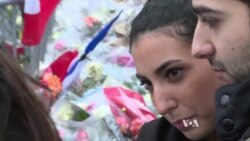After the attack on the kosher market in Paris last week, many members of the country’s Jewish population - the largest in Europe - are more anxious about their safety and their future.
For days after the attack, Jews and non-Jews came to the eastern edge of Paris to pay their respects.
“My heart goes out to those who fell for liberty, for France," said homeaker Francoise. "I’m a Christian, but all people are equal, all the same, and we should have freedom for all.”
But many of France’s Jews are not feeling particularly free in the wake of the attack. One young couple came to mourn a friend who was killed in the market.
“Now, after what happened, unfortunately there’s a feeling of wanting to escape," said Rafael, a student. "We don’t want to leave, but sometimes we feel like we have to flee to protect ourselves.”
Rafael says he’s not sure whether France’s diverse communities can live together in peace anymore.
His wife Malka doesn’t want to leave France, but fears she may have to.
“This is my country. I love it. But I above all I love my religion," she said. "Why should we have to be constantly in fear, and hide our skullcaps and Jewish stars in the Metro so we’re not attacked? This is not a life.”
But that is not a universal view, in spite of previous attacks in France and Belgium, and numerous anti-Semitic incidents in Europe every year.
“We don’t have to be scared, we have good security over here and I don’t think it’s going to be worse than before,” said Levi, a student.
“I don’t want to leave. I want to stay here because I’m French. I’m Jewish, but I’m French,” said Alexander, a restaurant manager.
Still, the Paris attack is expected to fuel another increase in Jewish emigration from France to Israel, after it already doubled last year to 7,000.
That’s just over 1 percent of France’s Jewish community, but it will take more than police and army deployments to give French Jews more long-term security, says Yonatan Arfi, vice president of the Council of Jewish Institutions in France.
“We have to think about maybe reinventing the French society in order to struggle against this radicalization, because if we do not fight now against this radicalization, we are condemned to suffer from new attacks in the years to come,” he said.
Arfi says the solidarity march after the attacks could help spur action. But it may not come soon enough for Rafael and Malka.
“I never thought it would be like this," Malka said. "Now that I’m talking to you I don’t believe it’s true. I think that tomorrow I’m just going to wake up, pass my exams and live my normal life, forgetting that a friend of ours is dead.”
Malka is not likely to forget. But the concern is that the urgency created by the attacks won’t last long enough to result in the changes she and other French Jews want to see.





